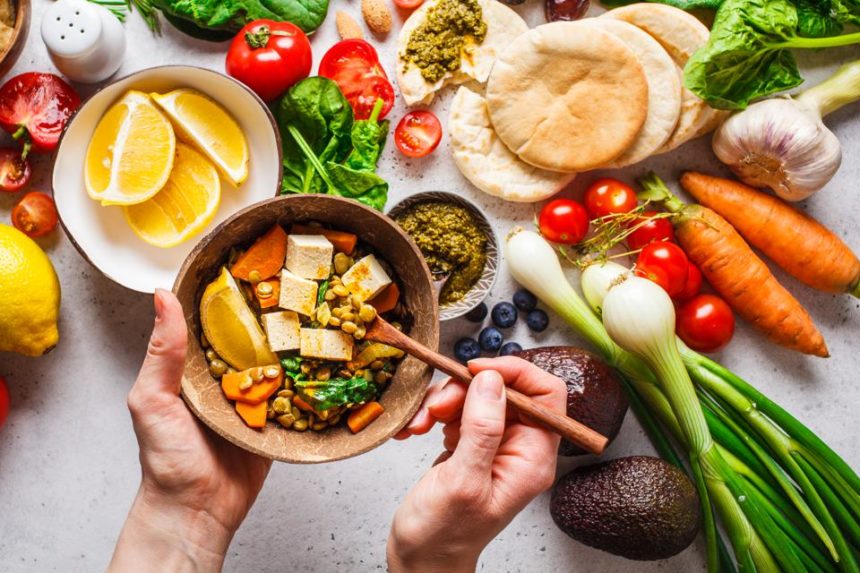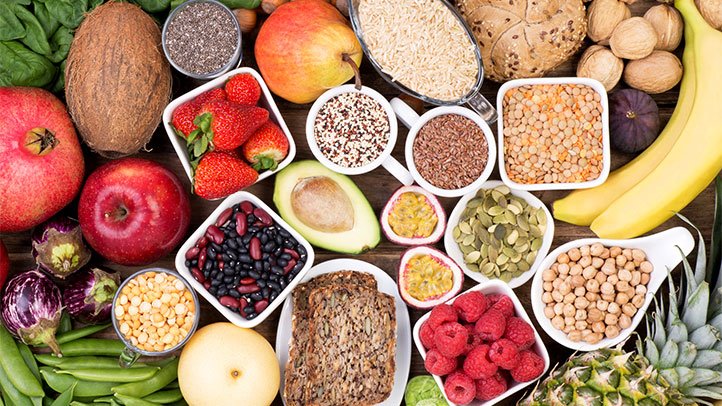
A plant-based lifestyle means you consume a diet rich in fruits, vegetables, legumes, nuts, seeds and to reduce or totally eliminate all products containing animal products (milk, cheese, meats etc.). Whether you’re considering eating less meat or giving it up entirely, the benefits are clear: less risk of disease and improved health and well-being. Specifically, less meat decreases the risk of:
- Heart disease
- Stroke
- Obesity
- High blood pressure
- High cholesterol
- Type 2 diabetes
- Many cancers
Meat is often loaded with cholesterol and saturated fat, which have starring roles in poor heart health. And processed meats like deli meat, bacon and sausage often have too much sodium as well. On the other hand, lean meats, skinless poultry, and fish can be good sources of protein.
Whichever diet you choose, just remember that removing meat doesn’t have to mean removing protein. There are plenty of foods that can fill the bill, like tofu, quinoa, mushrooms, lentils, chickpeas and most beans and legumes. And did you know there are many good vegetable sources of protein? That’s right, artichokes, asparagus, broccoli, Brussels sprouts, collards, corn, potatoes, peppers, spinach, sweet potatoes and turnip greens all provide a good amount of protein. In fact, every plant we eat has some protein in it. So you may be getting enough protein without meat.
The benefits from this type of lifestyle (plant based eating) is never ending; some of the benefits include:
Nutrition:
- Reduced amount of saturated fats. Dairy products and meats contain a large amount of saturated fats.
- Carbohydrates. Carbohydrates provide energy for your body.
- Fibre. A diet high in fibre leads to healthier bowel movements, which helps with weight loss.
- Magnesium. Nuts, seeds, and dark leafy greens are a great source of magnesium.
- Potassium. Diets high in potassium have shown to reduce the risk of cardiovascular diseases and cancer.
- Folate. Folate helps with cell repair, generating red and white blood cells, and metabolizing amino acids.
- Antioxidants. For protection against cell damage, antioxidants are one of the best ways to help your body
- Vitamin C. Helps boost your immune system
- Phytochemicals. Plant-based foods provide phytochemicals, which help to prevent and heal the body from cancer, boost protective enzymes, and work with antioxidants in the body.
- Protein. Beans, nuts, peas, lentils, and soy products are all great ways to get the right amount of protein in a vegan diet.
Disease Prevention:
- Cardiovascular disease. Eating nuts and whole grains, while eliminating dairy products and meat, will improve your cardiovascular health.
- Cholesterol. Eliminating any food that comes from an animal and you will eliminate all dietary cholesterol from your diet.
- Blood pressure.
- Type 2 diabetes.
- Prostate cancer. A major study showed that men in the early stages of prostate cancer who switched to a vegan diet either stopped the progress of the cancer or may have even reversed the illness.
- Colon cancer. Eating a diet consisting of whole grains, along with fresh fruits and vegetables, can greatly reduce your chances of colon cancer.
- Breast cancer. Countries where women eat very little meat and animal products have a much lower rate of breast cancer than do the women in countries that consume more animal products.
- Macular degeneration. Diets with lots of fresh fruits and vegetables, especially leafy greens, carrots, pumpkin, and sweet potatoes, can help prevent the onset of age-related macular degeneration.
- Cataracts. Produce high in antioxidants are also believed to help prevent cataracts.
- Arthritis.
- Osteoporosis.
Physical Benefits:
- Healthier Body Mass Index.
- Weight loss.
- Increased Energy.
- Healthy skin. The nuts and vitamins A and E from vegetables play a big role in healthy skin.
- Longer life. Several studies indicate that those following a vegan or vegetarian lifestyle live an average of three to six years longer than those who do not.
- Hair. Many who follow plant-based diets report that their hair becomes stronger, has more body, and looks healthier.
- Nails. Healthy vegan diets are also responsible for much stronger, healthier nails. Nail health is said to be an indicator of overall health.
- PMS. When switching to a plant-based diet, many women have said how their PMS symptoms become much less intense or disappear altogether.
Other Benefits:
- Animals. Consuming a plant-based diet helps ease your conscience of the animals being slaughtered for human consumption.
- Environment. Growing plants takes much fewer resources than growing animals. By eating a plant-based diet, you can help reduce the toll on the environment.
- E. coli. It comes from eating contaminated red meat and is the leading cause of bloody diarrhea. Young children, those with compromised immune systems, and elderly people can become extremely ill or die from E. coli. Eating plant-based means completely avoiding the risk of E. coli infection.
- Salmonella. Another gastrointestinal illness from animal products, salmonella food poisoning is closely related to E. coli. The most frequent way people contract salmonella food poisoning is through contact with raw eggs or raw chicken meat from chickens infected with salmonella.
- Hormone consumption. Eating animals that have been given hormones to speed growth (a common practice in the meat industry) means those hormones go into your body. Not only can this disrupt the natural balance of your hormones, but some of the hormones given to animals have shown to cause tumour growth in humans.
- Antibiotics. Antibiotics are frequently given to feed animals, which can lead to bacterial resistance. Many of the antibiotics used to treat human infections are also used in feed animals.
Going plant-forward is easier than ever these days. Start by searching out some enticing vegetarian recipes that are easy to prepare. Choose ingredients and flavours you know your family will enjoy. Experiment with a meatless meal once a week, then add more days as you get used to it. Odds are good that you will get used to it! Your heart health and your waistline might get used to it, too. Bon appetite.




